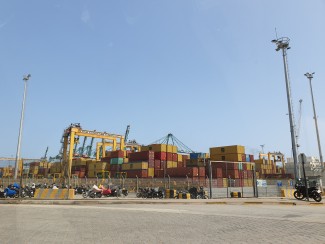New UNCTAD-EIF study of the fisheries sector in The Gambia shows trade policies have to be inclusive if they are to reduce poverty.
The expansion of the fisheries sector could help lift Gambians from poverty, in particular women, a new UNCTAD-EIF report has found, concluding that the inclusion of gender considerations in trade policy is a useful way to achieve greater prosperity for all. The case study warns that without built-in gender perspectives, the promotion of fish exports in The Gambia could in some cases actually worsen inequality between men and women.
The report, The Fisheries Sector in The Gambia: Trade, Value Addition and Social Inclusiveness, with a Focus on Women, is co-published by UNCTAD and the Enhanced Integrated Framework (EIF) Executive Secretariat on 6 March.
The Gambian fisheries sector has significant potential to make a major contribution to national socio economic development: it is a source of food and protein for the population; a source of revenue and foreign exchange earnings; and has significant potential to generate jobs, particularly for low income women.
The Gambia, Africa’s smallest mainland country with access to both banks of the River Gambia and 80 kilometers of the Atlantic coast of West Africa, has a special relationship to its waters and the fish that swim there. Sardinellas, shad and other types of fish are sold fresh or smoked in the country’s colourful markets. But while Gambians consume such locally-caught fish, they also export, among other seafood products, high-value sole, shrimp and lobsters to the European Union and other global markets.
The UNCTAD-EIF report, written against the background of efforts to achieve the third Millennium Development Goal to promote gender equality and empower women, shows that the structure of The Gambia’s fishing and fish processing sector offers insight into the way that women for whom fish provides a livelihood often lose out to men working in the same sector.
In the sector, men and women tend to produce distinct products, operate on different scales, and serve different markets. The result is specific gender-based trade patterns throughout the value chain.
Women are the predominant dealers and marketers of fresh and cured fish to domestic urban markets near landing sites, while long-distance trade involving relatively capital-intensive techniques and higher profit margins, including the export of frozen and smoked/dried fish products, is carried out mainly by men.
This division of labour reflects deeply entrenched social roles that restrict women’s mobility and access to productive resources in the fish value chain. Women tend to receive “diminished” assets and the parts of the fisheries sector that attract export-oriented investment do so at the expense of women working in the domestic market. Because men already largely control the export trade, the selective upgrading of this segment risks magnifying the existing split between large-scale male traders and small-scale women traders.
However, this need not be the case – export-oriented investment may lead to greater employment opportunities for women downstream, for example in processing factories, if the appropriate measures are in place. Women’s access to resources, including credit, and support services such as training in marketing and financial literacy, would greatly enhance their ability to benefit from new export opportunities. It is also important to explore niche markets for high-value products that can generate income for women, the study recommends.
More broadly, UNCTAD and EIF call for domestic, sub-regional and international perspectives to be carefully assessed in the light of food security, poverty alleviation and social inclusiveness.
“One challenge is that social issues are addressed in a different framework than economic issues and no sufficient synergies are established between the two,” Dr. Mukhisa Kituyi, Secretary-General of UNCTAD said. “For example, strategies for social protection should be closely linked to policies on employment, education and training. Due consideration should be given to changes in employment and welfare brought about by international trade. While there are ‘winners’ from trade liberalization, there are also ‘losers’, and their needs must also be addressed,” Dr. Kituyi added.
As the target date of the Millennium Development Goals in 2015 draws closer, it is clear that a lot more remains to be done to achieve them, and it has been suggested that the post-2015 agenda should address all kinds of inequalities in a more substantive way.
"In The Gambia, 80 per cent of fish processors and 50 per cent of small-scale fish traders are women. Through its Diagnostic Trade Integration Study Update, The Gambia has prioritized the need to build skills of women in income-generating activities," Dr. Ratnakar Adhikari, Executive Director of the Executive Secretariat for the EIF, said. "Together with the Government, we are strongly supporting a gender balanced Trade Facilitation project which aims to facilitate air cargo export of fresh horticulture and fishery products. We are also supporting the Government to leverage resources from development partners to build a sustainable and inclusive eco-friendly fishing model that puts focus on sharpening women's skills and women empowerment," Dr. Adhikari added.
As the study of The Gambia’s fisheries shows, putting in place coherent trade, infrastructure and social policies may be instrumental to achieving inclusive development and to reducing inequalities, including those based on gender. The gender perspective is key to bringing issues of sustainability and inclusion to the forefront of analysis, the study concludes.
The report forms part of the support that UNCTAD provided to The Gambia for the update of its Diagnostic Trade Integration Study and was carried out under the auspices of the Enhanced Integrated Framework for Trade-Related Assistance for Least Developed Countries.
______
Full report accessible here.
If you would like to reuse any material published here, please let us know by sending an email to EIF Communications: eifcommunications@wto.org.


